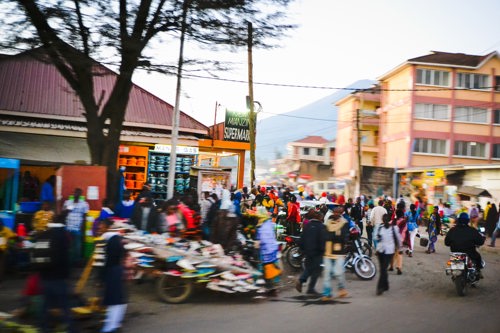Commonwealth Futures Climate Research Cohort: 26 researchers for climate action

Research-to-action (R2A) initiatives encourage researchers to implement actions or strategies based on multidisciplinary research findings, and often employ participatory, community-based methodologies to put knowledge into action.
‘To have real impact on the ground, research should be translated so that concerned stakeholders or actors can accept the knowledge as evidence and act upon it,’ writes Dr Haseeb Irfanullah, Programme Coordinator of IUCN Bangladesh and the Climate Research Cohort’s research-to-action (R2A) facilitator.
Nowhere is R2A more urgent than in the field of climate change and sustainability. As the latest IPCC report makes clear, if we are to avoid disastrous climate change the time to act is now – and we must do it together. At this critical moment, the 26 rising stars of the Climate Research Cohort have come together to design 5 R2A projects transforming multidisciplinary knowledge into climate action. Their work is continued testament to the dedication of the academic community to seek solutions and reinforce hope for change on the frontlines of climate change.
The cohort’s R2A projects covered a range of COP26 presidency priorities and Sustainable Development Goals such as nature-based solutions, food systems, environmental education, energy access, and ocean sustainability. Each multidisciplinary project team pools their diverse expertise to drive the projects and influence climate decision-making and adaptation practices at multiple levels, from local communities to policy spheres.
Get to know the projects and teams. Click to jump to project description:
Policy pathways for mapping clean technologies with energy access in the Global South – a case for rural communities’ sustainable development (SENSouth)
Team members
- Dr Constantinos Vassiliades, University of Cyprus
- Eric Boachie Yiadom, University of Professional Studies Accra, Ghana
- Dr Ogheneruona Endurance Diemuodeke, University of Port Harcourt, Nigeria
- Dr Ravita Devi Prasad, Fiji National University
- Dr Wassim Dbouk, University of Southampton, UK
Project context and rationale
The world’s richest countries are responsible for over 90% of excess global carbon emissions, but low-income countries are the most vulnerable to the repercussions of climate change. Despite the abundant availability of renewable energy resources across many low-income countries, there is often insufficient research and a lack of financial and technical capacity to produce and utilise clean energy in key sectors, such as transport and housing. This results in inadequate policy pathways to reduce countries’ reliance on environmentally-harmful energy sources – not only hampering global efforts to combat climate change, but also exposing the world's least resilient rural communities to health hazards. Governments also shoulder heavy financial burdens to recover from climate change impacts.
To preserve the planet for future generations, it is imperative we change the way we generate energy to meet different developmental needs.
Objective
The SENSouth project team aims to engage key stakeholders across low-income countries to explore possible strategies, and policy pathways, to overcome barriers for sustainable energy uptake in rural communities. They will identify and highlight affordable clean energy technologies that currently exist, and map them to the needs of target rural communities.
It is hoped that project outcomes will be published in local or international magazines, and captured in an academic journal article.
Outcomes
- Policy brief highlighting existing affordable clean energy technologies and mapping them to the needs of rural communities
- Promotional video and infographics shared through digital platforms
- Podcast episode with relevant stakeholders to discuss the topic
- Virtual policy workshops with target universities
- Download the SENSouth Project Report and SENSouth Policy Report
Nature-based solutions (NbS) for coastal adaptation: a comparison between Nigeria and Scotland
Team members
- Dipl. Met. Astrid Werkmeister, University of Strathclyde, UK
- Dr Chukwueloka Udechukwu Okeke, Covenant University, Nigeria
- Dr Olujumoke Adesola Ogunrayi, University of Cape Coast, Ghana
- Dr Olumuyiwa Bayode Adegun, Federal University of Technology Akure, Nigeria
- Dr Scott J Davidson, University of Waterloo, Canada
Project context and rationale
Scotland’s marine and coastal landscapes are facing numerous pressures from climate change, which negatively impacts both ecosystem functioning and communities who live and work along the coasts. Meanwhile in Nigeria, rising sea levels, coastal erosion, increased precipitation, storms, and warmer ocean temperatures pose similar threats to coastal communities and ecosystems.
In order to protect coastal communities in both countries from increasing climate change impacts, strategies for adaptation are urgently needed. Nature-based solutions (NbS) - or actions to protect, manage, or restore ecosystems - are promising alternatives to traditional engineering methods for climate adaptation.
However, knowledge gaps and uncertainties about NbS currently hamper its widespread uptake. The impacts of NbS are not always recognised at community levels, and high-level science is often misunderstood by the public. Such knowledge gaps are barriers to developing the full potential of NbS for climate, nature, and people across Scotland and Nigeria. Therefore, a clear statement of the implications of NbS for human wellbeing – as well as effective communication with local communities – is vital on the road towards implementing NbS approaches with the buy-in of decision-makers and community stakeholders.
Objectives
The project team will highlight the significance of NbS in addressing climate change impacts in coastal communities. They will be using case studies from Nigeria and Scotland to communicate common challenges to different sets of stakeholders in both countries. It is envisioned that this project will also open doors for future collaborations on NbS between Nigeria and Scotland.
Outcomes
- Local workshops to improve public understanding of the current policy and legal landscape for NbS, as well as state-of-the-art solutions
- Infographics to raise awareness, inform, and educate international audiences on NbS
- Download the Nature-based Solutions Project Report
Breaking silos for food production systems innovation and improved climate resilience

Team members
- Dr Chandima Ariyarathna, University of Peradeniya, Sri Lanka
- Dr Iroja Caldera, University of Colombo, Sri Lanka
- Dr Oyediran Olusegun Oyebola, University of Ibadan, Nigeria
- Dr Rachel Friedman, Australian National University
- Dr Stephen Summers, Nanyang Technological University, Singapore
Description
Food systems are regarded as a major driver of climate change, through the inefficient use of fertilizers and livestock-produced emissions among other factors. We urgently need climate-smart practices and innovations to tackle these challenges head-on – but there are persistent gaps between the development, communication, and adoption of climate-smart innovations and technologies.
Both problems and solutions for food production systems are highly context-dependent. In some instances, we need to recognise gaps in research and innovation; in others, we need to connect research and innovation to grassroots users and encourage uptake. Ultimately, to address food insecurity in a changing climate, we need to break down the silos between the development, communication, dissemination, and adoption of appropriate interventions.
Objective
The project’s primary objective is to stimulate discussion around underutilised technologies and innovations that could lead to transformative change in food production systems, with a focus on the barriers that hamper adoption and uptake as well as opportunities for progress. The team will also be synthesising lessons on the changes required in food systems research, innovation, and policy pathways as they apply to climate change mitigation and adaptation – with an eye specifically on COP26 processes.
Outcomes
- A series of case study briefs to drive online discussions and raise the profile of food production technologies and innovations
- Synthesis discussion piece published on media platforms to raise stakeholder awareness on key issues
- Webinar to discuss lessons learned and collect feedback on the synthesis
- A social media awareness campaign
- Download the Food Systems Project Report
Reducing ocean pollution for climate change adaptation and mitigation: perspectives from South Africa, Seychelles, Jamaica, Eswatini and Barbados
Team members
- Dr Andrea Clayton, Caribbean Maritime University, Jamaica
- Dr Daniel Etongo, University of Seychelles
- Dr Henri-Count Evans, University of Eswatini
- Marium Alleyne, University of the West Indies Cave Hill Campus, Barbados
- Dr Refilwe Mofokeng, University of KwaZulu-Natal, South Africa
- Tracy-Ann Hyman, University of the West Indies Mona Campus, Jamaica
Project rationale
The ocean serves as the largest carbon sink on the planet, but this function is being impaired by severe global plastic pollution. Approximately 8 million tons of plastic is deposited in our oceans every year, forming an estimated 80% of all marine debris. Most response strategies have taken a top-down approach focused on policy and legislation geared towards the consumer, in the form of bans, taxes, or levies. This can tackle the problem at source, with manufacturers providing non-plastic or biodegradable alternatives for consumers.
On the other hand, grassroots initiatives and innovations, as well as community-based initiatives, also make significant contributions towards the transition to a low-carbon society where waste can be effectively managed. Bottom-up initiatives are important in addressing large-scale policy changes and shifting local social practices and behaviour.
A combination of strategies to eliminate ocean pollution will help preserve ocean health and reduce overall greenhouse gas emissions by restoring the ocean’s function as a natural carbon sink. The reduction of plastic pollution and proper waste disposal can also reduce damage to life and properties for communities around the world.
Objective
The project team aims to document the current state of coastal plastic waste disposal across five countries – South Africa, Seychelles, Jamaica, Eswatini, and Barbados – which share similar marine plastic pollution challenges. The team will work to improve stakeholders’ understanding of the issue, and demonstrate the impact of community engagement. They will also identify lessons learned and best practices to address waste generation and climate adaptation from a 'ridge-to-reef' perspective.
Outcomes
- A digital media campaign to improve general understanding of marine pollution and climate change
- Technical report
- A short documentary
- Infographics highlighting key recommendations
- Outreach to policymakers and practitioners to discuss good practices for ocean-related climate action
- Identification of common challenges and opportunities for collaboration across the five countries
- Download the DRAMAH Project Report
Commonwealth youth in climate action for COP26 and beyond
Team members
- Ms Fatma Abdelaal, University of Canterbury, New Zealand
- Dr Kokila Konasinghe, University of Colombo, Sri Lanka
- Dr Lucy Richardson, Monash University, Australia
- Dr Mahendra Gooroochurn, University of Mauritius
- Mr Rufino Varea, University of the South Pacific, Fiji
Description
According to UN estimates, the world is home to 1.8 billion young people between the ages of 10 to 24 – the largest generation of youth in history. If climate action is not taken now, young people will be the ones who must contend with the worst impacts of climate change. Their perspectives and ideas are crucial since the decisions made today will directly affect their future – and the future of their children.
Young people have a key role to play as future leaders, but there is a lack of youth participation in community decision-making processes on climate change. The project team aims to address this gap by carrying out an online survey targeting young people across the Commonwealth. The results of this survey will improve our understanding of the level of youth participation in climate action and engagement in policymaking, and identify the key enablers and barriers to youth participation.
Objectives
The project team’s core aim is to raise the profile of youth perspectives and insights on climate change issues, and reduce gaps between young people and policymakers by encouraging greater youth participation in climate-related decision-making. To do this, the team will assess Commonwealth young people’s knowledge of, and perceived solutions for, climate change, as well as their interest in participating in policymaking processes. Project findings will be placed in the context of existing literature, in order to produce recommendations for increasing youth participation in climate-related decision-making.
Outcomes
- A series of training workshops and participatory events, including collaborative focus groups, on findings and recommendations emerging from the survey (two in-person workshops planned in Sri Lanka and Mauritius, and five expert-led virtual training events)
- Digital campaign to share survey findings
- Summary of recommendations for youth engagement across the Commonwealth
- A formal report
- Short videos documenting youth voices and success stories
- Download the ComYouth Project Report
Research-to-action facilitator





